It’s a hard winter for British homegardeners…
Christmas agrobiodiversity
Agricultural biodiversity on display for Christmas in a Parisian street market.
Pike Street Market
“Local” and “exotic” agrobiodiversity on show at Seattle’s Pike Street Market.
Reviving the Plant Genetic Resources Newsletter
We have received almost thirty comments endorsing the idea of reviving the Plant Genetic Resources Newsletter. Now Robert Koebner, one of the people behind the initiative, replies. 1
I appreciate all the supportive messages, thanks everyone. I wanted to respond to the issue raised by Hannah J and elaborated by Paul N. The situation with regards publication outlets for academic, fully peer-reviewed PGR papers is that there are currently 2 fully dedicated journals (GRACE and PGR:C&U), while a number of plant breeding type journals also publish PGR material. The gap is for the “grey” literature — a lot of this never gets disseminated, not because its quality is poor, but because it does not easily fit the format and requirements of a normal scientific paper. Our aim with PGRN is definitely not to compete with GRACE etc., so we have no intention of seeking an impact factor. We want to offer the community a means to communicate at a more practical, less academic level. We do not want PGRN to become a bin for rejected papers, and for this reason there will be a firm quality control imposed. I would expect the rejection rate to be well over 50%, going on our experience with PGR:C&U, where this rate is nearer to 75%. At the same time, we would want to be as responsive as possible to the readership; one way to do this (there may well be many others) is to offer the opportunity for opinion-based, rather than exclusively results-based contributions.
Shepherds and their flocks trek through Europe
Evelyn Mathias of the League for Pastoral Peoples and Endogenous Livestock Development just posted an interesting piece on DAD-Net. Unfortunately I was not able to find a web page to link to, so I take the liberty of reproducing the post in full here.
They are good-natured, produce tasty meat, and their wool gets turned into sweaters. Everyone knows so much about sheep. But few people know about the benefits that sheep provide through grazing. As they move from place to place, mobile flocks maintain the ecology, so conserving many threatened plants, animals and insects. The landscapes they create enhance the quality of life for local people and tourists alike.
Grassland that has been extensively grazed in a controlled way is an excellent water filter. It protects the soil from wind and water erosion, stores a huge amount of carbon, and converts carbon dioxide into oxygen in winter when trees no longer have leaves.
But grassland must be maintained through grazing – otherwise it will be overrun with brambles and scrub, which lack many of the advantages of grasses. Mobile flocks of sheep are an important way to conserve these landscapes.
To raise awareness of the advantages of mobile livestock production, Europe’s shepherds have organized a sheep trek across Germany, Belgium and the Netherlands during the summer of 2010. The trek aims to draw attention to the contribution that mobile herding makes.
“Shepherds all over the world face similar problems”, says Günther Czerkus, spokesman for the German shepherds association. “Too much bureaucracy, and an increasing number of restrictions that make it more and more difficult to maintain a mobile herd.”
Shepherds in Europe also find it difficult to market their products. Wool prices are so low that it is not profitable to shear the sheep. And the market for meat is dominated by imports from New Zealand. Czerkus hopes that the trek will encourage consumers to buy home-grown lamb.
The trek will start in Berlin on 5 June and end at the “Green Land Day” (Grünlandtag) in Trier on 16-17 October. The trek will be a kind of a relay walk, with each flock and shepherd covering a certain distance and then handing over to another flock for the next stage. Accompanying vehicles will manage traffic and distribute information materials.
Special events in Paderborn (1 August), Duisburg (21 August), Brussels (16 September) and Trier (17 October) will highlight the contributions of sheep. Other events may be organized through hout the trek. The trek will provide excellent opportunities for school classes to learn about agriculture and ecology in general, and mobile herding in particular.
A similar but smaller trek took place in Belgium in 2008. The webpage from this earlier trek gives an idea of what a trek might look like.


